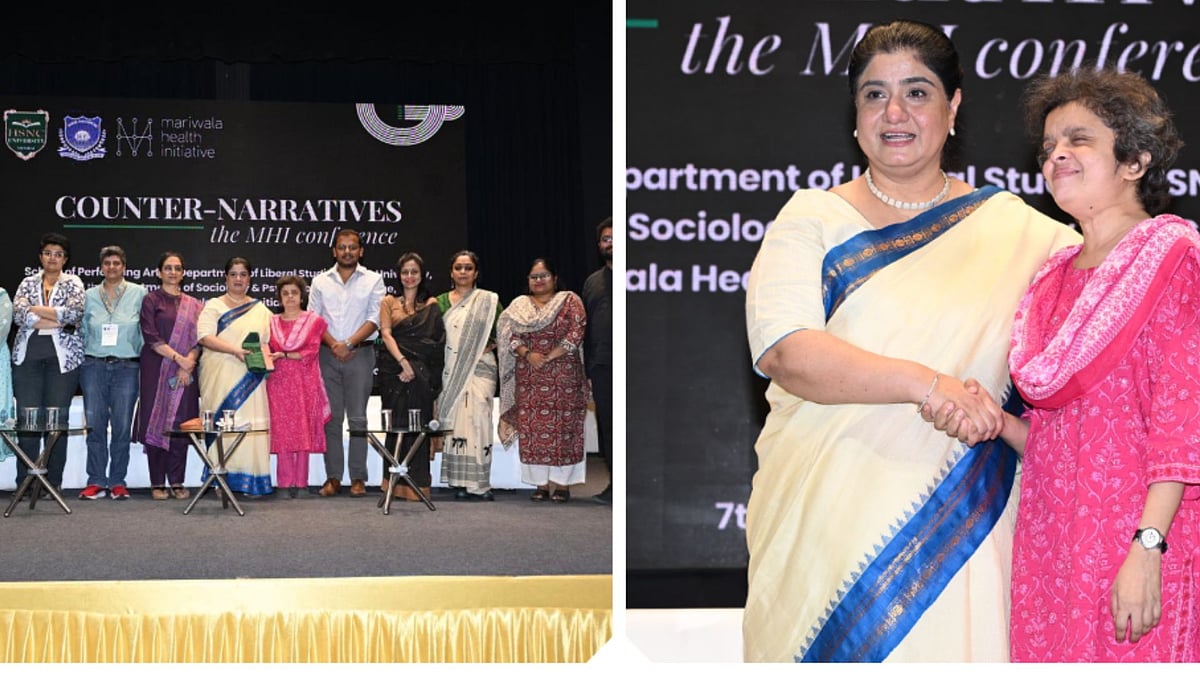HSNC University Collaborates With Mariwala Health Initiative For Groundbreaking Mental Health Conference |
HSNC University, Mumbai in collaboration with the Mariwala Health Initiative (MHI) and the Departments of Sociology and Psychology at KC College, Mumbai and School of Performing Arts (SOPA), organised the launch of the ‘Counter-Narratives’ Conference series. Held at KC College’s campus, the inaugural event, titled ‘Mental Health of Marginalised Communities: Perspectives from India,’ brought together thought leaders, activists, scholars and community members to engage in critical discussions on mental health from an inter-sectional perspective.
This first edition of the Counter-Narratives Conference focused on how mental health is intricately linked to caste, gender, sexuality, disability and socio-economic status. The Conference highlighted the role of systemic inequalities in shaping psychological distress, while providing a platform to challenge dominant narratives about mental health.
“At HSNC University, we believe that mental health is not just an individual concern, but a collective one deeply embedded in the social, political and economic frameworks that shape our society. Through this Conference, ‘Counter-Narratives,’ we aim to amplify the voices of marginalised communities and address the systemic challenges they face in accessing mental health care. HSNC University has always embraced diversity and inclusivity as part of our core values. By collaborating with Mariwala Health Initiative, we are committed to fostering dialogue that redefines mental health, prioritising equity and advocating for change at every level of our society,” stated Col. Dr. Hemlata K. Bagla, Vice Chancellor, HSNC University, Mumbai.

“The Conference’s theme, ‘Counter-Narratives,’ is not just about offering an alternative viewpoint, but about giving space to voices that have long been silenced. Through this collaboration, we aim to shift the conversation around mental health towards collective healing and justice for marginalized populations.This inaugural event seeks to challenge dominant narratives around mental health, urging us to examine the structural inequities that continue to perpetuate mental distress. Education is a powerful tool for empowerment, and we believe everyone deserves the opportunity to learn, grow, and achieve their dreams, regardless of their caste, religion, gender identity or sexual orientation. Our University stands firmly in its commitment to fostering an inclusive and compassionate dialogue that drives meaningful action. We are proud to be part of this transformative initiative, working towards an equitable and just approach to mental health care for all,” Dr. Bagla added.
“We are very happy to collaborate with MHI. It is important to factor in intersecting vulnerabilities and systemic exclusions within the mental health discourse. This collaboration affirmed our commitment to creating and nurturing an inclusive, safe and enabling campus in higher education,” said Dr. Leena Pujari, Dean of Interdisciplinary Studies, HSNC University, Mumbai.
“It is crucial that we move beyond a one-size-fits-all approach to mental health. By amplifying the perspectives of those who have historically been left out of the conversation, we can better understand the nuanced experiences of marginalised communities and create solutions that are truly inclusive and impactful,” said Dr. Krittika Mondal, Assistant Professor, School of Performing Arts.
The discussions delved into the intersections of mental health and systemic oppression, emphasising how issues like caste-based discrimination, gender violence, queerphobia and economic marginalisation exacerbate mental health issues. Panel discussions, research presentations and powerful lived experience storytelling unpacked the barriers to care created by these intersecting factors.
The Conference called for a shift away from individualised, medicalised approaches to mental health in favor of intersectional, community-driven solutions. One of the core themes revolved around the de-colonisation of mental health care, with speakers advocating for the inclusion of indigenous healing practices, community-led interventions and rights-based approaches to care.
The Conference also shed light on how state policies and institutional structures perpetuate exclusion and mental health disparities for marginalised communities. Organisations such as Kerala State Health Systems Resource and NGOs including Anubhuti Trust, Guftagu, Umul and Dalit Desk were actively involved in the discussions.
By gathering a diverse set of voices—ranging from academics and mental health professionals to activists and community members—the Conference aimed to reshape mental health discourse in India.
The Counter-Narratives Conference is a crucial step toward making mental health care in India more inclusive, accessible and reflective of the diverse identities and lived experiences of its people.
